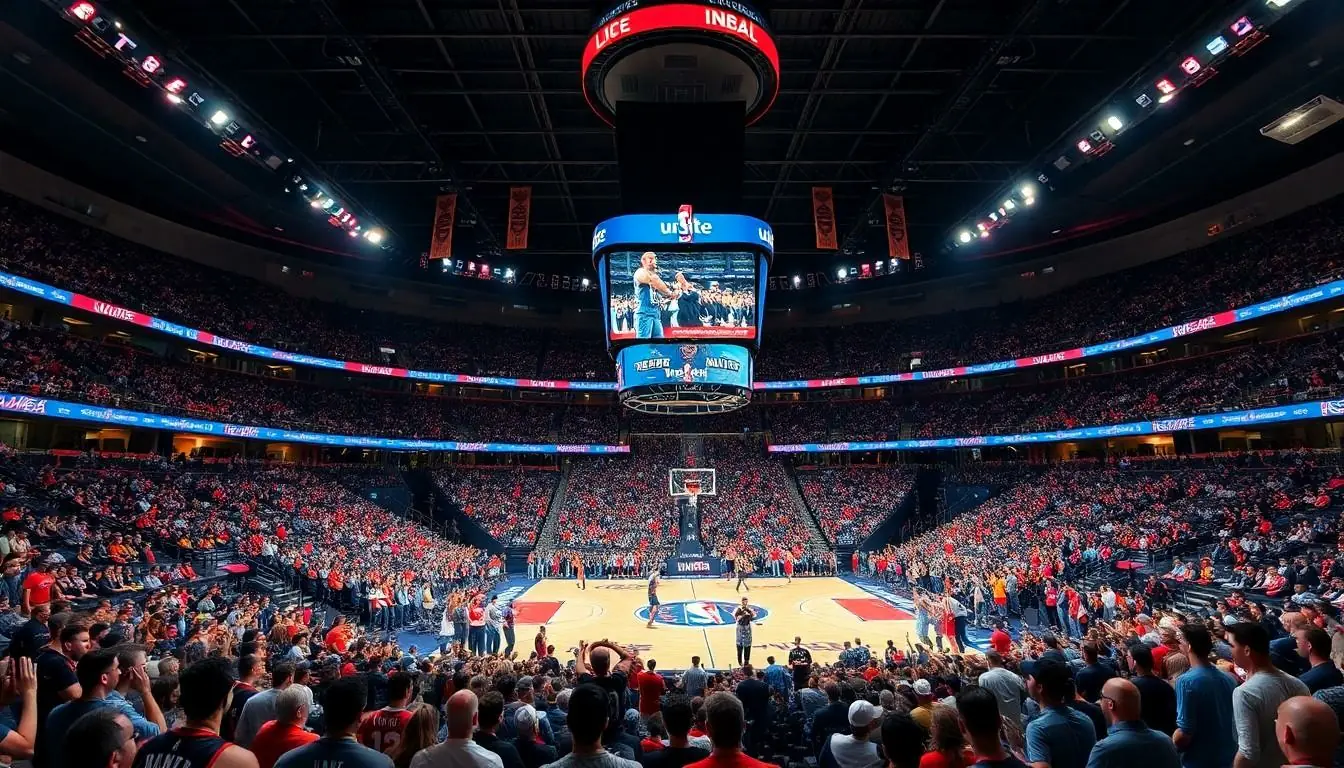When it comes to the NBA, some teams aren’t just shooting hoops; they’re raking in bucks. The world of basketball isn’t just about slam dunks and three-pointers; it’s also a high-stakes game of dollars and cents. Imagine owning a piece of the hardwood that’s not only thrilling to watch but also worth its weight in gold.
Table of Contents
ToggleOverview of Most Valuable NBA Franchises
The financial landscape of the NBA showcases impressive valuations for its franchises. According to Forbes, the Los Angeles Lakers lead the rankings, valued at approximately $5.9 billion. Additionally, the New York Knicks follow closely with a worth of around $5.8 billion.
Franchise value correlates with various factors, including market size, team performance, and fan engagement. A strong fan base significantly enhances revenue through ticket sales and merchandise. Team performance also plays a critical role; successful seasons boost visibility and attract lucrative sponsorship deals.
Revenue streams diversify across broadcasting rights, sponsorships, and merchandise sales. With a national TV deal generating billions annually, franchises like the Golden State Warriors, valued at around $5.6 billion, benefit from increased exposure.
Furthermore, historic teams like the Boston Celtics, valued at $4.5 billion, maintain strong legacies that attract loyal fans and sponsors. The shift towards digital media streams adds another dimension, as franchises leverage social media and streaming services to engage audiences effectively.
Understanding these valuations provides insight into the NBA’s economic environment. Franchises not only focus on winning games but also on maximizing financial performance, making ownership an appealing investment. With financial strategies continually evolving, the most valuable NBA franchises represent both tradition and innovation in the sports industry.
Factors Influencing Franchise Value
Several elements contribute significantly to the value of NBA franchises. Understanding these factors reveals how financial success intertwines with team dynamics.
Revenue Streams
Revenue streams play a pivotal role in franchise valuations. Ticket sales generate substantial income during home games. Merchandise sales further enhance revenues, as fans eagerly purchase jerseys and memorabilia. Additional contracts for sponsorships create further financial benefits. Broadcasting rights represent another lucrative revenue source, providing teams with substantial guarantees and performance-based payouts. The combined effect of these streams solidifies the overall economic foundation of each franchise.
Market Size
Market size directly influences a franchise’s potential revenue. Teams located in major cities attract larger fan bases. Significant populations translate into increased ticket sales, merchandise distribution, and broader media exposure. Larger markets often command higher broadcasting deals, boosting revenue potential. As franchises engage their local communities, they cultivate loyalty that enhances attendance and participation. These factors establish robust connections between market size and franchise valuation, highlighting the strategic advantage of teams in populous areas.
Brand Equity
Brand equity shapes the perception and overall worth of an NBA franchise. Historical success contributes significantly to brand recognition. Loyal fans cultivate strong emotional attachments, resulting in reliable revenue streams. A well-established brand attracts sponsors eager to capitalize on its influence. Social media presence and community outreach efforts further enhance brand visibility. Unique selling propositions create competitive advantages, cementing franchises as desirable investments. The combination of brand strength and market perception underscores its vital role in determining franchise value.
Top 5 Most Valuable NBA Franchises
The financial landscape of the NBA showcases the impressive value of top franchises. Here’s a closer look at the most valuable teams.
Franchise 1: Analysis and Insights
The Los Angeles Lakers rank at the top with an estimated value of $5.9 billion. Market size and star power contribute significantly to this valuation. Ticket sales consistently generate revenue, while numerous sponsorship deals enhance financial stability. The franchise’s success attracts a global fan base, further boosting merchandise sales and viewership.
Franchise 2: Analysis and Insights
The New York Knicks follow closely with an estimated worth of $5.8 billion. Playing in one of the largest markets, the Knicks leverage their location to secure lucrative broadcasting rights. Strong historical performance has cemented a loyal fan base, resulting in high revenue from ticket sales. Sponsorships aligned with their legacy add another layer of financial strength.
Franchise 3: Analysis and Insights
Valued at $4.5 billion, the Boston Celtics hold a significant position in NBA history. Their rich legacy attracts a devoted following, ensuring consistently high merchandise sales. Broadcast contracts further contribute to its robust financial standing. Successful team performance enhances brand equity, making the Celtics a valuable asset.
Franchise 4: Analysis and Insights
The Golden State Warriors, valued at $4.3 billion, represent innovation in both playstyle and financial growth. Recent championship success fuels fan engagement and ticket sales. The team’s tech-savvy market approach propels merchandise sales and sponsorship opportunities. Strong branding continues to draw new investment.
Franchise 5: Analysis and Insights
Finally, the Chicago Bulls, valued at $3.3 billion, showcase historical significance combined with modern appeal. Their iconic status from the 1990s still attracts fans worldwide, driving merchandise sales. Large market presence boosts ticket demand, while lucrative sponsorships enhance overall revenue. Fan loyalty remains a vital asset for continued growth.
Future Trends in Franchise Valuation
Technological advancements are reshaping franchise valuation in the NBA. Teams increasingly leverage data analytics to optimize performance and engage fans, driving revenue growth. Digital platforms facilitate broader marketing strategies, enhancing fan interaction.
Emerging media rights play a significant role in future valuations. Streaming services are becoming central to broadcasting deals, offering teams new revenue opportunities. The trend suggests franchises could see income diversification through these forward-thinking agreements.
Globalization also influences franchise worth. International fan bases expand market reach, allowing franchises to tap into new revenue streams. Moreover, teams exploring overseas games foster stronger connections with global audiences.
In addition to these factors, sustainability initiatives are gaining traction. Fans now prioritize environmentally responsible practices, influencing their loyalty to franchises. Teams adopting green strategies might enhance brand equity and attract environmentally conscious sponsors.
Lastly, economic fluctuations can impact valuations. Inflation rates and changes in consumer spending influence ticket sales and merchandise revenue. Monitoring economic indicators will be essential for teams as they assess and adjust financial strategies.
Together, these trends signal a dynamic shift in how NBA franchises will be valued in the future, reflecting a blend of innovation and market adaptation.
Conclusion
The landscape of NBA franchise valuations underscores the intricate balance between sports and business. As teams continue to leverage their market presence and fan engagement, their financial worth is set to evolve. The impact of technology globalization and sustainability will shape future valuations and revenue streams.
Ownership of an NBA franchise is more than just a passion for the game; it’s a strategic investment that reflects broader economic trends. As franchises adapt to changing dynamics they’ll likely see new opportunities for growth and success in the ever-competitive sports market.




